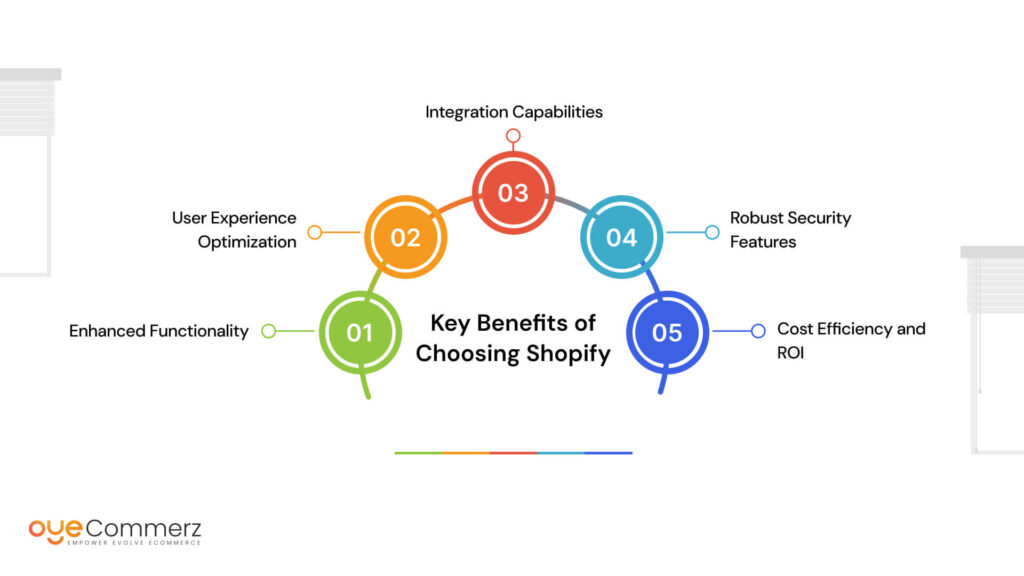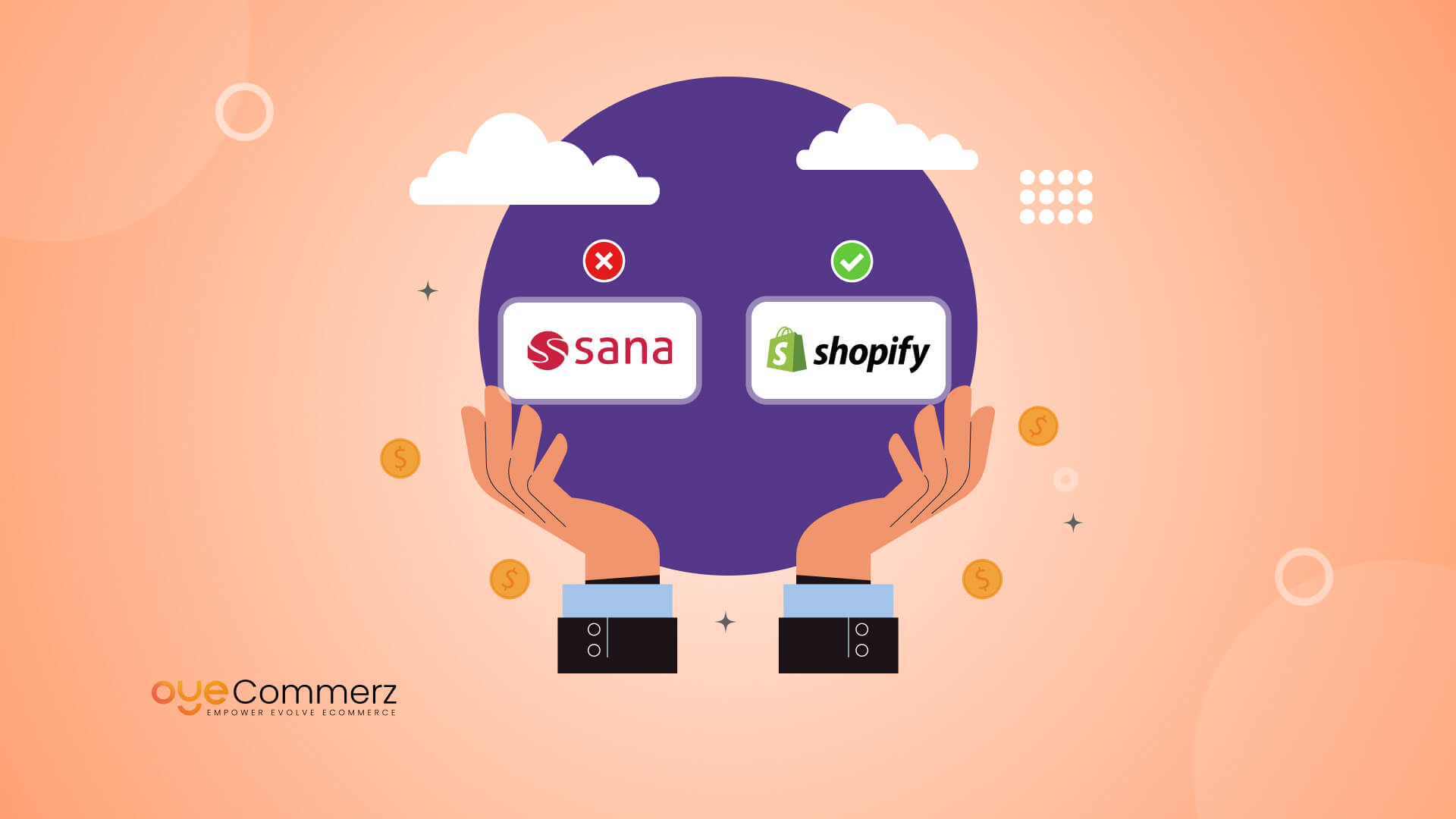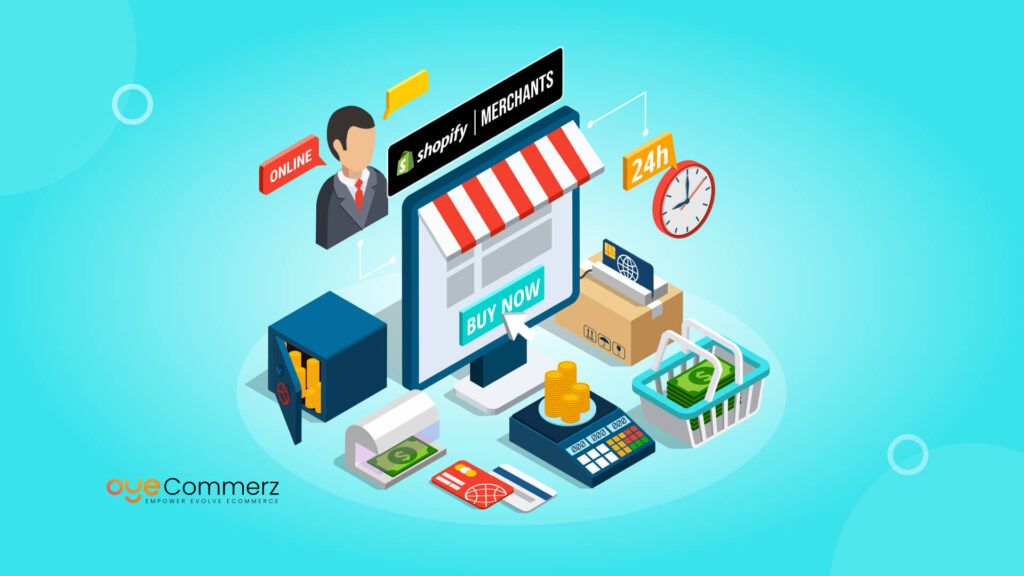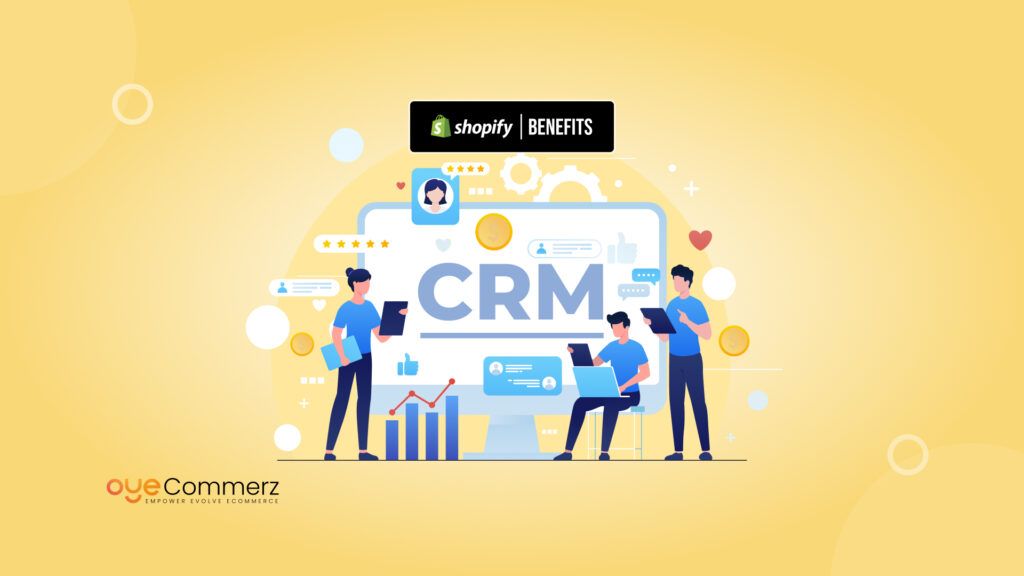Choosing Shopify over Sana Commerce can feel like a game-changing upgrade for modern entrepreneurs. Shopify isn’t just another eCommerce platform; it’s a powerhouse built for flexibility, innovation, and ease of use. In today’s fast-paced digital world, your online store needs to do more than just sell it needs to captivate, convert, and grow with you. Shopify empowers businesses with user-friendly tools, stunning templates, and seamless integrations, giving you the freedom to build a store that feels as bold and unique as your brand. Whether you’re scaling your business or starting fresh, Shopify’s unmatched features and community support make it the go-to choice for the next-gen entrepreneur. Ready to see why it’s a perfect fit for you? Let’s go!
Table of Contents
ToggleOverview of Sana Commerce and Shopify
What is Sana Commerce?
Sana Commerce is a comprehensive eCommerce platform designed to help businesses build and manage online stores, with a strong emphasis on integrating seamlessly with ERP (Enterprise Resource Planning) systems. It is particularly tailored for B2B (business-to-business) companies that need to manage large product catalogs, handle complex pricing models, and maintain real-time synchronization between their eCommerce and ERP systems.
Key Features of Sana Commerce:
- ERP Integration: Sana Commerce is built to integrate natively with major ERP systems like Microsoft Dynamics, SAP, and others, ensuring real-time updates of product data, inventory, pricing, and orders directly between the eCommerce platform and ERP.
- B2B Focus: The platform is highly suited for B2B eCommerce, offering features like customer-specific pricing, bulk ordering, and personalized catalogs, which are essential for businesses dealing with wholesalers or large corporate clients.
- Customization: Sana Commerce provides extensive customization capabilities to cater to the specific needs of large enterprises, offering flexible templates and the ability to build unique eCommerce solutions.
- Multi-Channel Support: Sana Commerce allows businesses to manage multiple sales channels, including eCommerce websites, mobile applications, and even in-store sales, offering a unified experience across all touchpoints.
Why Businesses Have Historically Chosen Sana Commerce: Sana Commerce has been a popular choice for large-scale businesses and enterprises due to its powerful integration with ERP systems. For companies that rely heavily on real-time data synchronization and need to manage complex workflows across their supply chain, Sana Commerce offers a seamless solution. The platform is also well-suited for industries with high-volume transactions, where efficient product management, customer relationships, and order processing are key. Furthermore, businesses with long-term, large-scale B2B relationships appreciate Sana Commerce’s ability to customize the shopping experience, implement complex pricing rules, and provide secure order management.
What is Shopify?
Shopify is one of the world’s leading eCommerce platforms, designed to provide businesses of all sizes with an easy-to-use, scalable solution to create and manage online stores. Known for its user-friendly interface and extensive app ecosystem, Shopify has become a go-to platform for entrepreneurs, startups, and even large enterprises looking for a flexible and cost-effective eCommerce solution.
Key Features of Shopify:
- User-Friendly Interface: Shopify is widely praised for its intuitive, drag-and-drop interface, making it easy for business owners and teams (even those with limited technical expertise) to build, manage, and optimize their online stores.
- Scalability: Shopify supports businesses of all sizes, from small startups to large enterprises, and offers various plans (including Shopify Plus for high-volume merchants) to meet specific business needs.
- App Ecosystem: Shopify boasts an extensive app marketplace, providing thousands of third-party integrations to extend the functionality of online stores, ranging from marketing tools to payment processors, inventory management, and more.
- Mobile Optimization: All Shopify themes are mobile-friendly, ensuring that businesses can offer a seamless shopping experience on smartphones and tablets, a must-have in today’s mobile-first world.
- Customizable Themes: Shopify offers a wide selection of pre-designed themes, which are highly customizable to fit a business’s branding and functional needs. This flexibility makes it easy to create a unique online store.
- Built-In Payment Gateway: Shopify Payments simplifies the payment process, providing integrated payment options that allow businesses to accept credit card payments, digital wallets, and other payment methods.
Why Businesses Choose Shopify: Shopify’s popularity is largely due to its ease of use, flexibility, and scalability. Businesses of all sizes from small eCommerce startups to large enterprises choose Shopify because it enables them to build a professional online store quickly and with minimal technical knowledge. Shopify is ideal for businesses that want a simple, cost-effective, and fast way to start selling online while having access to a broad range of features and tools that support growth. With lower initial setup costs and ongoing expenses compared to other platforms, Shopify is a great option for businesses looking for an affordable yet comprehensive eCommerce solution.
Key Benefits of Choosing Shopify Over Sana Commerce

This article delves into the key benefits of making the switch, providing insights tailored to executives and decision-makers in the U.S. e-commerce landscape.
Enhanced Functionality
Comprehensive E-commerce Tools
One of the foremost advantages of choosing Shopify after Sana Commerce is the extensive suite of e-commerce tools that Shopify offers. This platform provides an all-in-one solution that integrates inventory management, order processing, and customer engagement features, simplifying operations for enterprise-level businesses.
- Inventory Management: Shopify’s intuitive inventory management system allows businesses to monitor stock levels in real-time. This capability facilitates efficient replenishment strategies and minimizes the risk of overstocking or stockouts.
- Order Processing: Automated workflows streamline the order fulfillment process, reducing manual tasks and improving accuracy. An optimized order process improves operational efficiency while also increasing customer satisfaction through prompt deliveries.
- Customer Engagement: Shopify offers robust marketing tools, including personalized email campaigns and seamless social media integrations. These features empower businesses to engage customers effectively, nurturing relationships that lead to repeat purchases.
Scalability and Flexibility
Enterprise-level e-commerce operations often face the challenge of scaling. Shopify excels in this area by providing a flexible infrastructure that can grow with your business needs. This scalability is crucial for maintaining performance during periods of rapid growth.
- Performance: Shopify’s infrastructure is built for high-speed performance. Page load times are critical for user retention; research from Google indicates that a one-second delay can result in a 20% decrease in conversions.
- Customization: The platform’s robust API capabilities enable businesses to create custom integrations and tailored features, ensuring the platform aligns with unique operational requirements. This flexibility allows Shopify to adapt as your business evolves.
User Experience Optimization
Intuitive Interface
An intuitive user interface is essential for both customers and administrative teams. Shopify’s dashboard is designed for ease of use, allowing team members to navigate the platform efficiently.
- Streamlined Navigation: The dashboard allows users to access key metrics and make real-time changes to their store without extensive training. This ease of use boosts productivity and shortens the learning curve for new team members..
- Mobile Responsiveness: As more consumers turn to mobile devices for shopping, Shopify’s mobile-responsive design guarantees a smooth and consistent experience across all platforms. This adaptability is crucial for capturing sales from mobile users.
Superior Customer Experience
Delivering an exceptional customer experience is paramount for driving loyalty and repeat business. Shopify provides businesses with tools that enhance the shopping experience, ensuring customers have access to the features they expect.
- Personalization: Leveraging advanced analytics, Shopify enables businesses to track customer behavior and preferences. This data can be used to provide personalized recommendations, significantly enhancing the shopping experience.
- Fast Checkout Process: Shopify’s optimized checkout process minimizes cart abandonment rates. Research shows that even a one-second reduction in checkout time can increase conversion rates by 2.7%, underscoring the importance of a smooth purchasing journey.
Integration Capabilities
Seamless Third-Party Integrations
For enterprise-level e-commerce businesses, the ability to integrate with existing tools is critical. Shopify boasts a vast array of integrations with leading third-party applications, making it easier to enhance functionality and streamline operations.
- CRM Systems: Integrating with customer relationship management (CRM) systems allows for better customer insights and more targeted marketing efforts. This integration fosters a more cohesive approach to customer engagement.
- Payment Gateways: Shopify supports multiple payment gateways, ensuring that businesses can offer customers the flexibility and security they demand during online transactions.
Multi-Channel Selling
Another vital aspect of Shopify’s integration capabilities is its support for multi-channel selling. Businesses can leverage multiple platforms to reach consumers, expanding their market reach.
- Social Media Integration: Shopify allows businesses to connect their stores with social media platforms like Facebook and Instagram, enabling social selling and enhancing brand visibility.
- Marketplaces: The platform facilitates listing products on major marketplaces such as Amazon and eBay, helping businesses reach customers where they are most likely to shop.
Robust Security Features
Compliance and Data Protection
In an age where data security is a top concern, choosing Shopify after Sana Commerce ensures that enterprise-level businesses are equipped with robust security measures that protect sensitive customer information. Shopify is PCI compliant and provides encryption for data transmission, keeping customer data secure.
- Ongoing Security Enhancements: Shopify’s specialized security team consistently monitors the platform, proactively addressing potential vulnerabilities to protect against cyber threats.
- Fraud Analysis Tools: The platform includes built-in fraud analysis tools that help identify and mitigate fraudulent transactions, further enhancing overall security.
Peace of Mind
For executives and decision-makers, the assurance that comes with Shopify’s security features is invaluable. With comprehensive data protection measures in place, you can focus on growth strategies rather than worrying about potential breaches.
Cost Efficiency and ROI
Lower Total Cost of Ownership
Transitioning from Sana Commerce to Shopify can also result in a lower total cost of ownership. Shopify’s subscription-based pricing model, combined with its extensive feature set, allows enterprises to save on costs related to infrastructure, maintenance, and support.
- Reduced Maintenance Costs: Shopify’s cloud-based solution eliminates the need for extensive IT resources to manage servers or software updates, allowing businesses to redirect their focus to strategic initiatives.
- Scalable Pricing Plans: Shopify offers a range of pricing tiers that cater to businesses of all sizes, enabling organizations to select a plan that aligns with their budget and growth projections.
Improved ROI
Investing in Shopify can lead to improved return on investment (ROI) as businesses benefit from enhanced functionality and increased sales. According to recent reports, companies that migrate to Shopify experience an average revenue increase of 20% within the first year.
- Enhanced Sales Opportunities: With features such as abandoned cart recovery and upsell recommendations, Shopify provides tools that can directly boost sales and revenue.
- Analytics and Reporting: Shopify’s robust analytics capabilities allow businesses to track performance metrics, making it easier to identify growth opportunities and optimize marketing efforts.
Start Your Seamless Migration to Shopify Today!
For organizations planning to move from Sana Commerce to Shopify, our expert team is ready to provide tailored solutions for a smooth and successful transition. With our specialized services, you’ll experience a hassle-free migration and boost your eCommerce success.
Contact us today to schedule a consultation and take the first step towards elevating your e-commerce success!
Contact to Migrate your Site to Shopify Now
Conclusion
Choosing Shopify over Sana Commerce offers enterprise-level e-commerce businesses a multitude of benefits, from enhanced functionality and user experience optimization to robust security and cost efficiency. As the e-commerce landscape continues to evolve, migrating to a platform that aligns with your business objectives is crucial for sustained success. Shopify not only streamlines operations but also equips businesses with the tools necessary to thrive in a competitive environment.
For organizations looking to navigate their migration from Sana Commerce to Shopify, Oyecommerz is here to help. Our expert team specializes in providing tailored solutions that ensure your transition is smooth and successful.




